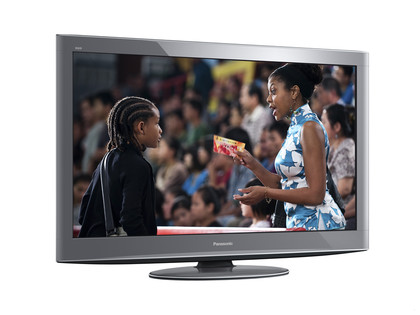Why you can trust TechRadar

The improvements in picture quality heralded by Panasonic's 2010 NeoPDP system have led some of the brand's recently reviewed plasma screens to be compared to Pioneer's legendary, but now defunct, KURO plasma. High praise, and likely no accident, given that Panasonic got its hands on much of the Pioneer expertise when the latter company pulled the plug on plasma.
Happily, the P42V20 continues the rich vein of form, managing to be even better, in fact, than the already outstanding G20 series we've covered before.
As is usually the case with Panasonic plasma TVs, the single most outstanding aspect of its performance is its black level response.
Dark movie scenes or games are delivered with shades that really do look black, rather than having to struggle through the grey clouding associated to some extent with most other flatscreens, especially LCDs. This immediately makes them more convincing and less tiring to watch, as you're not straining through any grey mist to see what's happening.
But also exceptional is the way this inky blackness is achieved without having to rein in the picture's overall brightness as you often have to with liquid crystal screens. This helps the P42V20 reproduce loads of the subtle detail in dark areas that most flat screens simply can't show - a very handy trick indeed if you're trying to spot early the shadowy assassins in the perennially dark environments of the Xbox 360's Alan Wake game. It's this shadow detailing which for us gives the P42V20 its edge over its cheaper G20 siblings.
Rich, deep blacks like those on the P42V20 are also important for the foundation they provide for the screen's colour reproduction. As a result, even though the P42V20's pictures aren't as aggressively bright as those of many LCD TVs, they feel at least as dynamic and punchy, as the brightest whites and richest colours are able to coexist within the same frame as the deepest blacks, without the overall brightness level having to be compromised.
It's also really pleasing to find that, unlike with LCD TVs, black levels don't lose their depth if you watch the screen from even a very wide angle.
NeoPDP prowess
Also crucial to the P42V20's success are its colours. The two successive generations of NeoPDP technology Panasonic has introduced to its plasma screens have produced quantum leaps in the richness and naturalism of the colours its screens can produce.
Reds, in particular, are now a million miles from the orangey oddness we'd almost become accustomed to previous to last year's first NeoPDP screens. Also, the old penchant for a green bias to sneak into dark scenes now only appears subtly and on very rare occasions.
The P42V20 makes great use of its full HD resolution and impressive video processing, too, to reproduce high-definition pictures of superb sharpness and detail. Plasma's innate response time advantage over LCD also means the clarity isn't troubled in the slightest by resolution loss when showing motion. Even judder is minimised, thanks to the efforts of the 600Hz engine.

In fact, the P42V20 gets as near to delivering the 'window on another world' HD purity we always look for as any 42in TV we've ever seen.
Although it obviously looks its best with HD footage, though, we should stress that the P42V20 is far from a mug with standard-def. It rescales it very intelligently to its full HD pixel count, in fact, keeping noise to a minimum while adding details and sharpness that doesn't look forced or unnatural.
There are still small areas for Panasonic to work on. The Intelligent Frame Creation system that helps reduce judder occasionally throws up an unwanted processing artefact.
There is mild, periodic dotting noise on skin tones during horizontal camera pans, those with very light rooms might wish for a little more overall brightness and, as noted earlier, just occasionally there's still a tiny bit of green bias evident in dark scenes. But none of this stops the P42V20's pictures from representing the state of the art, particularly if you're a Blu-ray film fan.
Current page: Panasonic TX-P42V20: Picture
Prev Page Panasonic TX-P42V20: Ease of use Next Page Panasonic TX-P42V20: Sound and valueJohn has been writing about home entertainment technology for more than two decades - an especially impressive feat considering he still claims to only be 35 years old (yeah, right). In that time he’s reviewed hundreds if not thousands of TVs, projectors and speakers, and spent frankly far too long sitting by himself in a dark room.

